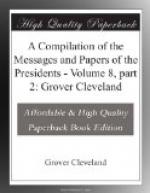Abandoning still more all respect for the neutral rights of the United States and for its own consistency, the British Government now demands as prerequisites to a repeal of its orders as they relate to the United States that a formality should be observed in the repeal of the French decrees nowise necessary to their termination nor exemplified by British usage, and that the French repeal, besides including that portion of the decrees which operates within a territorial jurisdiction, as well as that which operates on the high seas, against the commerce of the United States should not be a single and special repeal in relation to the United States, but should be extended to whatever other neutral nations unconnected with them may be affected by those decrees. And as an additional insult, they are called on for a formal disavowal of conditions and pretensions advanced by the French Government for which the United States are so far from having made themselves responsible that, in official explanations which have been published to the world, and in a correspondence of the American minister at London with the British minister for foreign affairs such a responsibility was explicitly and emphatically disclaimed.
It has become, indeed, sufficiently certain that the commerce of the United States is to be sacrificed, not as interfering with the belligerent rights of Great Britain; not as supplying the wants of her enemies, which she herself supplies; but as interfering with the monopoly which she covets for her own commerce and navigation. She carries on a war against the lawful commerce of a friend that she may the better carry on a commerce with an enemy—a commerce polluted by the forgeries and perjuries which are for the most part the only passports by which it can succeed.
Anxious to make every experiment short of the last resort of injured nations, the United States have withheld from Great Britain, under successive modifications, the benefits of a free intercourse with their market, the loss of which could not but outweigh the profits accruing from her restrictions of our commerce with other nations. And to entitle these experiments to the more favorable consideration they were so framed as to enable her to place her adversary under the exclusive operation of them. To these appeals her Government has been equally inflexible, as if willing to make sacrifices of every sort rather than yield to the claims of justice or renounce the errors of a false pride. Nay, so far were the attempts carried to overcome the attachment of the British cabinet to its unjust edicts that it received every encouragement within the competency of the executive branch of our Government to expect that a repeal of them would be followed by a war between the United States and France, unless the French edicts should also be repealed. Even this communication, although silencing forever the plea of a disposition in the United States to acquiesce in those edicts originally the sole plea for them, received no attention.




